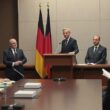Chancellor Friedrich Merz, leader of the Christian Democratic Union (CDU), is signaling a sharpened strategy to distance his party from the Alternative for Germany (AfD), acknowledging a historical miscalculation and attempting to redefine the political landscape. In an interview with the Frankfurter Allgemeine Sonntagszeitung, Merz expressed concern that a dangerous narrative is taking hold in public perception: that the CDU’s reluctance to unequivocally condemn the AfD allows the far-right party to exert disproportionate influence.
Merz argued that the AfD’s challenge extends far beyond questioning policies enacted under former Chancellor Angela Merkel. He characterized it as a fundamental assault on the principles of the Federal Republic of Germany as established by Konrad Adenauer and significantly shaped by the CDU itself. This assertion underscores a deepening anxiety within the CDU regarding the radical nature of the AfD’s agenda.
Pressed on whether the CDU has historically ceded too much political space to the right, Merz conceded, “Yes”. He pointed to the party’s stance on issues like cannabis legalization, integration policies and self-determination rights, implemented within the constraints of coalition politics, as evidence of this internal struggle. The CDU’s ability to fully articulate its vision, he implied, has been hampered by coalition dynamics.
A significant portion of Merz’s critique targeted the legacy of Merkel’s refugee policies. He directly linked decisions made in 2015, particularly concerning migration, to the subsequent surge in the AfD’s popularity-a controversial assertion that risks reopening wounds from a period of intense political upheaval. The AfD, he contended, thrives on an environment of political discontent prevalent across Western democracies, capitalizing on anxieties surrounding immigration and national identity.
The dramatic shift in the AfD’s electoral fortunes is stark: polling below the 5% threshold in August 2015, the party achieved 10.4% in the 2021 federal election and now consistently polls between 25 and 26.5%. This ascent, facilitated in part by perceived CDU inaction, has compelled Merz to confront the party’s shortcomings and undertake a more assertive posture. The effectiveness of this calculated distancing remains to be seen, especially given the complex and often volatile nature of German politics and the persistent appeal of the AfD’s populist message. The move also faces potential scrutiny for appearing reactive, rather than proactively defining the CDU’s identity.





